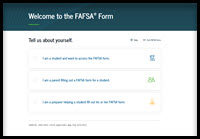A new Free Application for Federal Student Aid (FAFSA) becomes available each year on Oct. 1. The FAFSA for the 2022-2023 academic year is now available and high school seniors should be prepared to submit their application as soon as possible.
Your FAFSA will be used to determine your eligibility for federal and state financial aid—money that will help you pay for college. Since some types of aid are first-come, first served, it’s important to submit your FAFSA as soon after Oct. 1 as you can.
Here are some things to remember:
- The FAFSA is free; you should never have to pay to submit your FAFSA.
- It’s a snapshot of your (and possibly your parents’) financial situation which is used to determine how much aid you may be eligible to receive.
- When you submit a FAFSA, you’re not making any commitments to attend a certain school or to borrow student loans; you’re merely giving permission to the college(s) of your choice to discuss your financial aid options with you.
- The FAFSA’s not a one-time thing. You’ll need to submit a new FAFSA for each year that you need help paying for college.
- To submit your application online, you’ll need to set up a Federal Student Aid ID (FSA ID)—a username and password that will serve as your electronic signature. A parent may also need to create their own FSA ID. To create an FSA ID, go to StudentAid.gov and choose ‘Create Account.’
- Once your FSA ID is established, you can use it to complete your FAFSA at StudentAid.gov anytime on or after Oct. 1.
There are two questions that will appear on the FAFSA again this year, but are no longer valid.
- One question asks males: “Do you want us to register you with the Selective Service System?” Although federal law still requires males age 18-25 to be registered with Selective Service, it won’t affect your eligibility for aid if you haven’t registered yet and choose not to register on the FAFSA.
- The other question is: “Have you been convicted of the possession or sale of illegal drugs for an offense that occurred while you were receiving federal student aid?” While this question has never affected high school seniors, those who have received federal student aid in the past will no longer lose their eligibility due to a previous drug conviction.
Financial aid officers at the colleges you’ve listed on your FAFSA have been instructed to ignore any comments on these two questions so that you will qualify for student aid if otherwise eligible.
For more information about the FAFSA and federal eligibility requirements, be sure to check out other articles on this website, view the resources on UCanGo2.org and visit StudentAid.gov.

